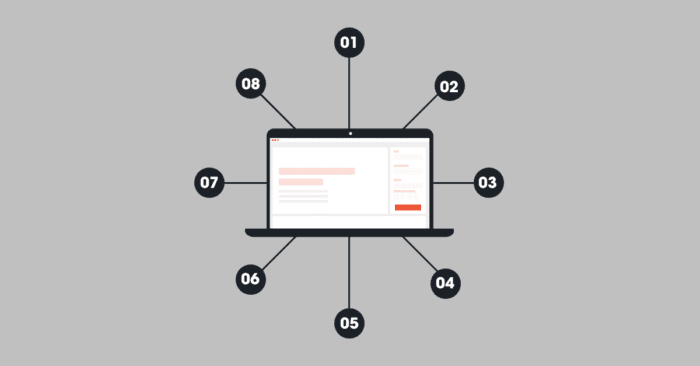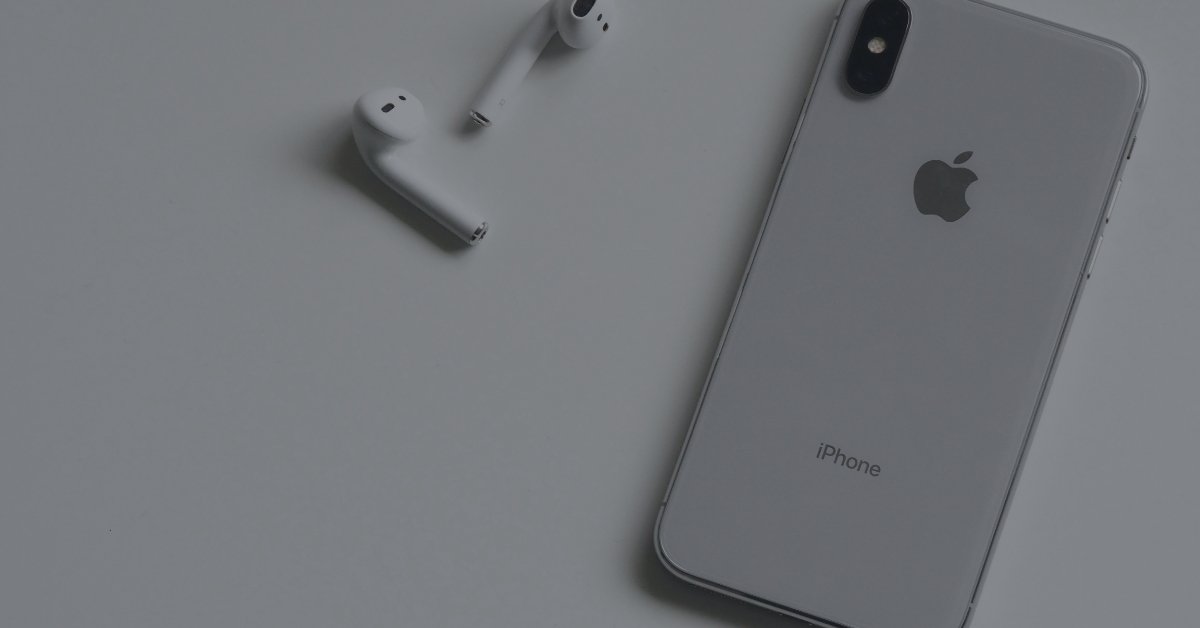What Does the New iOS 14 Policy Entail?
The new Apple iOS 14 update directly impacts how applications collect and utilize data. If you’d like to read the full brief published by Apple, it’s available here. The iOS 14.5 update will be launched on April 26th, 2021.
TL;DR: Apple requires that applications explicitly ask for user permission to track their data across third-party apps and websites. It’s expected that most people won’t opt-in for tracking, therefore, this is set to disrupt online advertising on platforms such as Facebook.
To comply with Apple’s policy, Facebook recently rolled out updates that marketers should be made aware of:
- The Facebook pixel is assigned to a website domain
- Brands are limited to 8 conversion events
- Changes to the attribution window
- Tracking and targeting limitation
In this article, our social media and data analytics experts, Marjorie Bessette and Franck Baldacchino, explain these changes and answer questions marketers might have in regards to this new policy. Keep reading!
When does it roll out?
Apple iOS 14.5 update rolled out on April 26th, 2021. Advertisers can expect a gradual adoption from users. As a result, the impact might not be noticeable right away.

1. Verify Your Website Domain
Facebook now recommends that every advertiser on its platform implements domain verification.
Why do I need to verify my domain with Facebook?
Facebook Pixel used to be assigned to ad accounts, but now, your Facebook pixel will be assigned to a verified website domain. Facebook highly suggests that businesses claim ownership of their domain in Business Manager as soon as possible to ensure their pixel data is as seamless as possible and control editing privileges.
What are the steps to verifying my domain on Facebook?
The steps to verify your domain on Facebook are available here: https://developers.facebook.com/docs/sharing/domain-verification/verifying-your-domain
In our experience, the first option, adding a DNS TXT entry to your DNS record, is the best way to verify your domain:
- Navigate to the DNS record section of your domain host.
- Add the TXT entry to your DNS record.
- Add @ to the Host field (if it is required by your domain host).
- Once the changes have propagated across your domain’s web servers, click the Verify button at the bottom of the DNS Verification tab for the selected domain.
Note: Typically, this change takes only minutes to occur, however, there are cases where it may take up to 72 hours to complete. - Leave the TXT entry in your DNS record as it may be checked periodically for verification purposes.

2. Configure 8 Preferred Web Conversion Events
Before the update, advertisers could track as many Conversion Events as they needed in Facebook Ads. This was especially useful to get a better understanding of the consumer journey. Brands could track different actions associated with various steps of the buying process (newsletter signup, add to cart, purchase, etc.)
With the recent update, advertisers can only track 8 specific events. And, note that these 8 conversion events will be ranked by priority. This means that if someone signups for a newsletter and makes a purchase, only the purchase (the higher prioritized event) will be reported.
What 8 events should I be tracking?
The 8 events you decide to track might vary from one business to another depending on their website’s goals. For example, an e-commerce company might want to track its most popular events such as purchases, add-to-carts, product views, newsletter subscriptions. And, a business focusing on lead generation might want to track form submission, landing page views, calls, ebook downloads, etc.
Can I change these events?
Yes, you can. That being said, there is a three-day delay that will apply when you change one of the 8 events.

3. Understand The Impact Of Attribution Window Setting
As of January 19th, Facebook’s attribution windows will be set at the ad set level, and will be limited to a seven-day click window instead of the default 28-day click and 1-day view.
Why did Facebook change its attribution window?
Apple’s new policy requirements bring limitations on data sharing that impacts the view-through signal. That’s why Facebook updated its attribution settings to 7-day click.
How does this 7-day attribution impact campaign performance?
Your Facebook campaign performance won’t be affected by this change, but you might see a different story in your report. The smaller window attribution means your conversion won’t be attributed to your Facebook Ads initiatives.
Depending on your product or service you might not see a major difference here. If your users usually convert in less than 7 days you won’t see a big difference in the number of conversions attributed to Facebook. If your consumer’s buying journey is usually longer than a week, the conversion reported in the Facebook platform will decrease considerably.
Can I use UTMs to make up for the conversion outside of the 7 day attribution window?
We always recommend using UTMs as they are an easy way to track results across various channels. So yes, UTMs can help identify which campaign, ad set and ad led to a conversion without relying on the Facebook Pixel.
However, keep in mind that Google Analytics is often set up in a last-click attribution model. And, Facebook ads usually play a bigger role in upper-funnel and mid-funnel tactics. It’s often used as a first touchpoint in a user’s buying process. Therefore, in a last-click model, Facebook will rarely get credit for the conversion. In that case, UTMs won’t help much.
Any advice on how to adapt to the changes to the new attribution window?
Thankfully, Facebook advertisers have the ability to dig through their past data with the 28-day click conversion window. We suggest comparing this attribution window to the new one (7-day click) to get a better understanding of how many conversions are under-reported on Facebook. This can be done through Facebook’s Comparing Window feature.
Some businesses might also want to invest in more robust data solutions like Big Query, Eulerian or Google Analytics 360. These come at additional cost, but might be extremely helpful to get insights into your consumer behavior and buyer’s journey.

4. Tracking and Targeting Limitation Due to iOS 14
There is no denying that the Apple iOS 14 update will have an impact on your tracking and targeting possibilities.
What impact will the “opt-in” feature have on my Facebook campaign’s performance?
For now, it’s hard to quantify how much of an impact Apple’s update will have on Facebook Ads in general.
But, what we know is that Facebook users can opt-out of tracking, which means that every action taken on your site by these users will be under-reported on Facebook. And, well, the Facebook platform relies on data to optimize your campaigns. Less data = less optimization = decrease in performance.
It’s also likely that we’ll see a decrease in targeting options, which could, in return, also impact campaign effectiveness.
How will targeting on Facebook Ads be impacted by the Apple Update?
We broke down the targeting options available on Facebook to give you a quick overview of which will be impacted and which probably won’t:
Core audiences
Behaviour and Interest: The quality of the audiences built on actions within the platforms (video views, engagers, etc.) won’t be affected. Interest-based targeting is also primarily built from platform interactions so it shouldn’t be affected as well.
Location and Demographics: When it comes to geographic and demographic targeting, advertisers will still be able to target by location and demographic characteristics. However, they won’t be able to break down data based on these segments.
Custom Audiences
Contact List: Your contact list is your property, therefore you’ll still be able to target your past customers or newsletter subscribers.
Site Visitors: Because Facebook will have less data available on who visited your site (the percentage of iOS 14 users that opt-out of tracking), your site visitor audience will probably be smaller.
App Users: With Facebook, you can serve ads to people who made a specific action on your app. Again, similar to website visits, your audience’s reach might decline as fewer people agreed to be tracked by Facebook.
Any advice on how to approach remarketing with the recent limitations?
As mentioned above, your remarketing campaigns are most likely going to reach fewer users.
Take some time to identify who your audience is by digging through your historical data in Google Analytics and see what percentage of users browse your site through an Apple mobile device. This will give you an estimated number of users you won’t be able to reach with your remarketing ads.
You’ll also want to check your frequency more often in your remarketing campaign on Facebook. As your audience gets smaller, you’ll want to avoid over-serving your ads to the same group of people. You’ll also have better control of your advertising spend and avoid creative fatigue.
What about other self-serve ad platforms like Snapchat and Pinterest, will they also be impacted?
One thing to remember here is that Apple’s update will affect all applications in the App Store.
For now, other advertising platforms like Snapchat, Twitter, Pinterest, TikTok, LinkedIn, have been pretty quiet about the impact it will have on their self-serve ad platforms. Essentially, we are still waiting for solutions coming from these different platforms.
But, as we see with Facebook, we also expect fluctuation in performance and changes to their attribution windows. Here’s more information on how iOS 14 will impact Snapchat and Twitter.
Any Other Questions?
There is constantly new information being shared about Apple’s iOS 14 update and its impact on advertising platforms. We’ll keep updating this article with new information as it slowly keeps coming in.
If you have any other questions, feel free to reach out to us.
Read it first:
Get new articles delivered to your inbox
ABOUT THE AUTHOR
Marie-Joëlle Turgeon
Marie-Joelle works at Bloom, a digital marketing agency, as the Director of Marketing. She's passionate about digital marketing tactics (from social media to web design) for B2B businesses looking to grow online.




Share this: